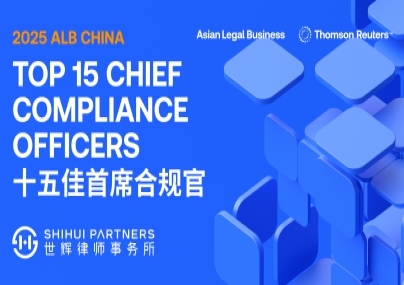
邓扬女士是斗鱼直播副总裁及首席法务官、国知局企业知识产权先进个人,拥有超过十年的互联网企业法律管理经验,先后服务于多家上市公司从事法务合规、纠纷防控及知识产权管理工作,对互联网内容行业的法律事务及风险管控有丰富的实践经验,尤其熟悉游戏及直播领域的知识产权创新、保护和纠纷处理 。
ALB:对于法务团队的建设和管理,您采取什么样的策略?
邓扬:法务部门虽然不是营收部门,但在整个业务流程中扮演了重要的“枢纽”角色,从业务开始谈判、签署合同,到后续合同履行,法务的工作覆盖业务的全生命周期。我们的策略主要包括三个部分:
1. 主动适应及管控业务风险
首先法务团队应该提前并主动地参与到业务中,进行全方位、全周期的风险识别和梳理。以合同为例,我们会对合同进行分类,根据类别进行系统及流程内风险点的预设和及时的预警提示,并制定相应的风控措施进行跟进和处理。目前我们的法务工作主要包括三个模块,分别是综合业务(包括合同主播、产品合规管理)、纠纷处理(包括各类纠纷和诉讼处理)、知识产权(包括专利、商标的的维权和侵权风险防范)。基于此,我们形成了一整套环环相扣的风险防控机制,内部各个组之间建立了完善高效的反馈机制,业务层面暴露出来的问题能够在全部门范围内进行有效的传导,并进行跨部门联动,从而形成一个风险识别、管理、暴露、改善的闭环。比如,在研发立项及产品上线流程中,我们会预设相应的法律风控节点,对于诉讼或中所暴露的风险,我们会及时做产品和合同的调整;如因广告素材涉嫌侵权发生的纠纷,我们会及时对相应的广告主或者广告代理进行审查,重新调整供应商审核的机制以及制定不同供应商的审核标准,通过由点及面的风控节点及措施全面管理法律风险。
同时,公司的决策层也非常重视公司的风险防控和法务管理,在日常工作中给予了法务团队充分的支持,使我们能够真正深入参与到业务中。在风控工作中,我们可以将管理的措施制定成标准流程,明确业务团队的合规要求,并且通过和人力部门合作,制定相应的激励及考核制度,确保合规政策的有效执行。此外,我们也和业务部门保持着良好的沟通,兼顾商业诉求和法律风险的平衡,减少与业务部门的分歧,并通过持续的合规培训,逐步提升业务部门的风险意识,对商业合作及产品方案达成共识共赢。
2. 关注成本控制和效率提升
传统观念通常认为法务部门是公司的费用部门,虽然没有营收部门明确的KPI考核标准,但日常工作中我们也非常关注人员的专业产出和工作价值,并通过对每个员工的工作内容的定性定量形成一套价值评估标准,从而通过部门内部以及跨部门的组织架构调整、人员工作职能调整,以及流程建构及优化,提升整个工作链条的的人员效率,尽可能地降低人均成本。比如通过对团队员工的工作内容的评估,剥离非法务专业性内容的工作,对大量重复低效的工作,及时通过SOP(Standard Operating Procedure ),特定工作指南等输出提升工作效率,持续优化标准合同等形式降低沟通成本。通过这样的形式,不仅可以提高人均工作产出,提升团队工作效率,也让团队成员能够专注更有挑战的工作任务,降低长期重复劳动带来的疲倦感,提升工作活力,也提高团队的稳定性。
3. 持续的人才培养机制
我们会充分利用内外部资源,建立起体系化的专业能力培养机制。身处内陆城市,招聘具有互联网经验的法务人才并非易事,因此我们慢慢摸索并创建了一套行之有效的人才培养机制,持续培养出具有合格专业能力的基层及骨干法务人员。同时,我们还紧密关注行业动态,及时更新专业知识,并且引入各种工具和外部专业资源和培训资源,包括业内公司拜访交流、跨组轮岗、跨部门实践等方式及制度保持团队专业技能与时俱进和并确保人员的有效备份。我们还鼓励甚至要求员工把自己的经验用文字进行总结和输出,通过自媒体或在线交流的方式分享经验,沉淀技能和经验的同时也共享专业实践。
此外,我们积极培养法务在企业工作中发现问题、解决问题尤其是复杂问题的能力。法务团队需要懂得平衡业务与法律之间潜在的冲突,更要具备发现问题的眼光和解决问题的思路。在工作中,除了专业技能的培训,我们也非常重视提高员工的沟通表达能力、非常规问题的处理及资源整合能力,通过老带新、虚拟工作组、头脑风暴、换位答辩等方式及时发现及反馈工作中的问题,提升改善人员的逻辑分析能力和思维模式,为优秀员工介入管理职能创造机会。
ALB:今年的疫情对您的团队乃至整个公司的运作产生了怎样的影响?作为总法律顾问,您带领您的团队做出了怎样的应对?
邓扬:疫情的影响主要体现在两个方面:首先,疫情期间,身处武汉这座较为特殊的城市,我们所面对的一大问题就是人员流失,很多人因为疫情而不得不暂停工作。同时,省外招聘的难度也越来越大,导致我们目前人员紧张,工作量激增。但是,得益于我们之前制定的工作备份、轮岗制度和成熟的内外部培训机制,我们依然将影响控制在了可以承受的范围内。第二,在目前疫情席卷全球、全球化放缓的大背景下,我们预估海外业务中的摩擦和纠纷可能会增加,因此,我们不仅会加强人员储备,还会重新做好整个政策法律风险的评估,引入合理的评估工具,并做好提前的风险预案。
ALB:您为企业建立起怎样的合规体系?该体系有何优势?
邓扬:除了前面所提及的各个业务组之间在合规管理方面的策略和措施,我们在流程建构和时间管理上也引入了各种系统化工具。首先,通过IT手段不断优化包括财务、业务、研发等在内的法务工作流程,打通各个部门之间的合作,提高跨部门工作效率;第二,我们注重数据分析,并借此加强流程上的时间管理。以合同为例,我们会定期统计各流程、各个环节所用的时间,优化审批链条减少流程环节,提高各个审批人的审批决策效率,比如为减少填表时需要手动填入、重复和复杂的部分,会建立可信息复用的基础信息库,并可视化审批决策需要的参考数据,为快速决策提供依据和支持。我们根据业务的整体开发方案,会提前规划数据分析的需求,确定数据分析的源数据、抓取粒度和分析维度,将数据分析嵌入到整个合同及法务数据管理系统中。
ALB:目前,科技手段在斗鱼的合规体系中得到了怎样的运用?自您上任以来,科技手段在法务团队工作中的运用经历了怎样的发展或变化?未来又将会如何发展?
邓扬:我们在2017年就引入了上上签线上合同系统,这也实实在在地给我们带来了很大的帮助。在斗鱼平台上,大量的主播分布在全国各地,异地合同的签署就会涉及来回邮寄,这不仅增加了经济和时间成本,而且更大的风险是很难确定合同是否由主播本人签署,给直播平台带来了潜在的涉诉风险。上上签系统通过多要素验证,确保了合同签订者的身份,从而保证了合同的有效性,帮助我们解决了根本性风险。此外,电子合同的签约方式还显著降低了管理成本,合同扫描、归档、保存、调取查阅等方面的工作效率都得到了极大的提高。
另外,我们也引入了很多其他的外部工具,包括企业工商信息的认证、企业历史征信查询、法律及案例数据库、在线公证系统、在线侵权监控等系统。同事我们也持续关注市场上的各种外部工具,并结合业务需求进行评估,对能够提升效率降低风险的第三方工具,我们都会尽可能引入到整体系统中,提高风控水平。
ALB:未来三到五年,您在工作方面有怎样的规划或展望?
邓扬:首先,我们要确保和加强法律风控对业务的有效支撑。斗鱼作为一个内容平台,其内容覆盖的受众、内容的形式、类型等等方面都有可能会有新的变化,作为法务团队,我们会继续跟进并关注新变化带来的法律层面的风险和挑战,同时提高相关知识储备和相应的人员储备。
第二,目前,与直播行业相关的法律法规以及法律体系还相对滞后,权利链条上各种主体之间也存在比较多的摩擦和纠纷,我们需要在处理纠纷的同时积极参与到法律建设、司法解释以及典型案例的确立中,通过诉讼、行业研讨以及积极参与到立法实践中的方式,与众多的行业参与者一起积极重构行业秩序,推动司法进程,减少各方摩擦和诉累,促进行业的健康有序发展。
第三,我们还将继续推动IT化进程,加强数据分析和管理。长久以来,我们已经充分体会到新技术带来的效能提升,我们也会在这一过程中不断发现更多可以优化的空间,持续改善工作、提高效率。
第四、虽然目前部分区域全球化放缓,但目前中国的互联网用户增长已经逐步趋缓,广阔的海外市场仍然是中国企业未来可能发力的新战场,因此我们也要为全球化的法律支撑工作做好相应的准备。
ALB Conversations: Deng Yang, Vice-President and Chief Legal Officer of Douyu TV
Ms. Deng Yang is the Vice-President and Chief Legal Officer of Douyu TV and one of the Enterprise Advanced Individuals on Intellectual Property of National Intellectual Property Administration. She has over a decade of experience in legal management of Internet companies, and used to serve in a number of listed companies by engaging in legal compliance, dispute prevention and control and intellectual property management. With rich experience in the practice of legal affairs and risk management in the industry of Internet content, Miss Deng is especially adept at intellectual property innovation, protection and dispute handling in the field of games and live streaming.
ALB: What is your strategy for building and managing the legal team?
Deng Yang: Although the legal department is not a business department, it plays an important "hub" role in the whole business process. From the beginning of the business negotiation and contract signing to the follow-up contract performance, the legal department covers the whole life cycle of the business. Our strategy mainly consists of three parts:
1. Proactively adapt and manage business risks
First, the legal team should actively participate in the business at the earliest possible time, carry out a comprehensive, full cycle of risk identification and sorting. Take the contract as an example, we will classify the contract, and then carry out the preset of risk points in the system and process as well as prompt early warning according to the category, and carry out corresponding follow-up and treatment as well as risk control measures. At present, we mainly have three modules, namely comprehensive business (including contract anchor and product compliance management), dispute handling (including all kinds of disputes and lawsuits), and intellectual property rights (including patent and trademark rights protection and risk prevention). Based on this, we have formed a set of interlocking risk prevention and control mechanisms, and established a complete feedback mechanism among internal groups. Problems exposed at the business level can be effectively transmitted across the whole department, thus forming a closed loop for risk identification, management and exposure. For example, for the risks exposed in litigation, we will make timely adjustment of products and contracts; for another example, if we receive a warning letter due to infringement of advertising materials, we will review the corresponding advertisers or advertising agencies in a timely manner and readjust the audit mechanism of suppliers and the audit standards of different suppliers.
The decision-making level of Douyu pays full attention to risks prevention and control, as well as the management of legal team, giving us sufficient authority during our daily work to enable us to truly participate in the business. For risks management work, we have developed a standard process and set clear compliance requirements for the business team. At the same time, we have also worked with the HR department to develop corresponding incentive and punishment measures and review system to ensure an effective implementation of compliance policies. In addition, we also maintain a good communication and training mechanism with the business department, keep balance between business needs and legal risks control, reduce disagreements with business teams and keep constant compliance training to gradually cultivate the risk awareness of the business department and reach a consensus on business cooperation and product plans.
2. Focus on cost control and efficiency improvement
The legal team is very cost-conscious and try to make people as efficient as possible. Although we do not have KPI standards like business teams, we still pay a lot of attention to the work value of our professionals, and form a value evaluation standard for each employee. We adjust the organization structure within and cross the department, optimize the process and improve the efficiency of the whole work chain, trying our best to reduce cost. For example, by evaluating the legal department employees’ work contents, we reduced many non-legal professional and repetitive work. By using the SOP (standard operating procedure) and certain work guides, the efficiency has been improved, and the communication cost is reduced by standard contracts. In this way, our team can focus on more challenging work instead of spending time doing repetitive work, making the team more stable.
3. Continuous personnel training mechanism
We make full use of internal and external resources to establish a systematic professional capacity training mechanism. In an inland city, it is not easy to recruit legal talents with Internet experience. Therefore, we have formulated a talent training mechanism to promote the growth of legal team in the internal system. At the same time, I also pay close attention to the industry dynamics, master new professional knowledge timely, introduce various tools and external professional resources and training resources, and keep the team learning regularly. We also encourage and even require employees to summarize their experiences in writing, share their experiences through we-media or online communication, and make progress together.
In addition, we actively cultivate the legal staff's ability to find and solve problems, especially complex problems. The legal team needs to know how to balance the potential conflicts between business and law, and more importantly, it needs to have the vision to find problems and the ideas to solve problems. In work, we also value our employees’ communication skills, their ability of dealing with non-regular issues and resource integration. By pairing senior employees with new ones, virtual work groups, brainstorming and so on methods, problems are timely spotted and communicated. Employees’ logical analytical capabilities are improved. And they will have chances to step in management work.
ALB: How has this year's outbreak affected your team's and your company's operations? As General Counsel, how did you lead your team to respond?
Deng: The impact of the epidemic is mainly reflected in two aspects: first, as we are located in Wuhan, a special city during the epidemic, we faced a major problem of staff loss because many people had to suspend their work due to the pandemic. At the same time, recruitment outside the province is also becoming more and more difficult, leading to our current staff strain and workload surge. However, thanks to our previous work rotation system and mature training mechanism, we still managed to keep the impact under control. Second, against the backdrop of the epidemic sweeping the world and the slowdown in globalization, we estimate that friction and disputes in overseas business may increase. Therefore, we will not only strengthen personnel reserves, but also re-evaluate the overall policy and legal risks, introduce reasonable assessment tools and make risk prevention and control plans in advance.
ALB: What compliance system have you established for the enterprise? What are the advantages of the system?
Deng: In addition to the compliance strategies and initiatives among the various business teams mentioned earlier, we have introduced a variety of systematic tools for process construction and time management. First, we have adopted IT means to constantly optimize the department process including finance, business, research and development, etc., to get through the cooperation between various departments, improve the efficiency of cross-department work. Second, we focus on data analysis to strengthen the process of time management. Take the contract as an example, we will regularly count the time taken by each process, and reduce the need for manual filling, and repetitive and unnecessarily complex work. We established a basic information base for repetitive information, visualize the reference data for review and provide basis and support for fast decision-making. According to the overall development plans of the business, we plan the needs of data analysis beforehand, determine the source data for analysis and data capture granularity as well as analysis dimensions, integrating data analysis into the whole data management work of contract and legal early and timely,.
ALB: How is technology being used in Douyu's compliance system? How has the use of technology in the work of the legal team evolved or changed since you took the role of GC? What will the future hold?
Deng: In 2017, we introduced the Bestsign's e-contract signing system, which has really helped us a lot. On Douyu platform, there are a large number of streamers who are in different cities with us, so the signing of the contract will involve postal delivery. This not only increases the economic and time costs, but also poses a greater risk: it is difficult to be sure whether the contract is signed by the streamers themselves, which brings potential litigation risks to the live-streaming platform. Through multi-element verification, Bestsign's system ensures the identity of the contract signatory, thus ensuring the validity of the contract and helping us solve risks at the fundamental level. In addition, the signing of e-contracts also significantly reduces the cost of management, as the work efficiency of contract scanning, archiving, storage, retrieval and so on has been greatly improved.
In addition, we have also introduced many other external tools, including corporate information authentication, corporate history information query, online notarial system, online infringement monitoring system, etc. We actively focus on the external tools currently available in the market. As long as they are effective, we will try our best to introduce them into the overall system to improve the level of risk control.
ALB: What are your plans for work in the next three to five years?
Deng: First, we need to strengthen our business support. As a content platform, Douyu's content coverage audience, content form, category and other aspects may have new changes. As a legal team, we will continue to identify and deal with the risks brought by the changes, and meanwhile improve the relevant knowledge reserve and the corresponding personnel reserve.
Second, at present, laws and regulations related to the live broadcast industry and the legal system thereof are not advanced enough, and there are a lot of frictions and disputes among various subjects in the industry chain. We need to actively participate in the process of legal construction, judicial interpretation and sorting out typical cases while dealing with disputes, so as to promote the legal process.
Third, we will continue promoting the IT process and strengthen data analysis and management. At present, we have enjoyed the support brought by the new technology, and we will also find more space for optimization, so as to continuously improve our workand efficiency.
Last but not least, the increase of Internet users in China has been slow down, making the overseas market a new battlefield for Chinese enterprises in the future. Therefore, we will prepare ourselves to provide legal support for future.
ALB Conversations is a weekly series of in-depth Q&As with leaders of law firms and in-house legal departments across Asia. If you are a managing partner or general counsel based in the region who is interested in being a part of this series, please send an email to shiyu.liu@tr.com.
对话ALB”(ALB Conversations)是一系列每周发布的深度对谈类文章,我们将与亚洲各地的律所管理者和企业总法律顾问展开对谈。如果您是执业于亚洲地区的律所管理者或总法律顾问,并有兴趣参与该系列访谈,请邮件联络shiyu.liu@tr.com.


